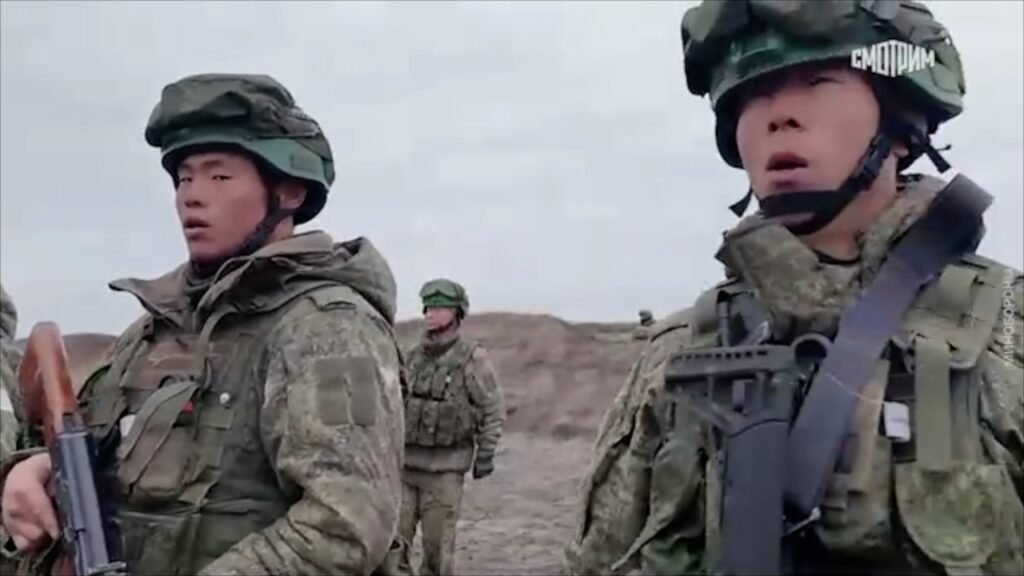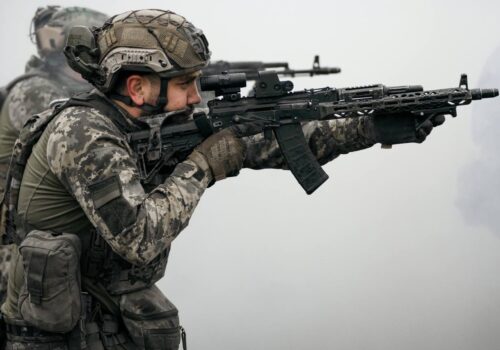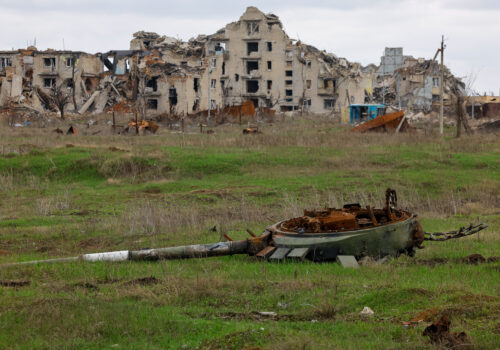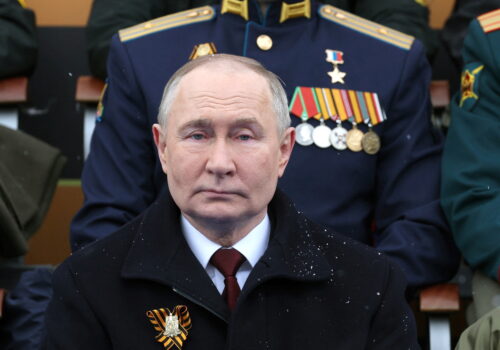More than six months after the story was first reported, Russian President Vladimir Putin has officially confirmed the presence of North Korean troops in Russia’s war against Ukraine. “We will always honor the Korean heroes who gave their lives for Russia, for our common freedom, on an equal basis with their Russian brothers in arms,” he commented on April 27.
Putin’s announcement was mirrored by similar official confirmation from the North Korean side. Pyongyang praised the “heroic feats” of North Korean troops fighting alongside the Russian army in a front page article published by the state-run Rodong Sinmun newspaper last weekend.
Stay updated
As the world watches the Russian invasion of Ukraine unfold, UkraineAlert delivers the best Atlantic Council expert insight and analysis on Ukraine twice a week directly to your inbox.
Claims of North Korean troops participating in Russia’s war against Ukraine first began to circulate in October 2024. However, the Kremlin initially denied the North Korean presence, with Russian officials remaining tight-lipped on the subject until late April.
Moscow and Pyongyang appear to have coordinated their recent statements, indicating that both partners felt the time was now right to confirm the involvement of North Korean forces in Russia’s war. Official confirmation came as Putin proclaimed the defeat of Ukrainian forces in Russia’s Kursk region, where the bulk of North Korean soldiers are believed to have been deployed.
Moscow’s decision to confirm the presence of North Korean soldiers after months of denials could prove damaging to the Kremlin’s credibility at a time when questions are already being asked over Russia’s commitment to US-led peace talks to end the war in Ukraine. In recent days, US President Donald Trump has signaled his mounting frustration with Putin’s apparent stalling tactics, and has suggested that the Russian leader may be “tapping” him along.
The appearance of North Korean troops alongside their Russian counterparts on the front lines of the war against Ukraine represents the latest stage in a deepening military alliance between the two countries. North Korea has been supplying Russia with significant quantities of military aid since the early stages of the war in 2022. Deliveries have included millions of artillery shells as well as ballistic missiles, which have been used to devastating effect against Ukrainian cities.
Eurasia Center events

North Korea’s direct participation in the war against Ukraine is a watershed moment in modern European history. It is also widely seen an indication of the Russian army’s mounting recruitment issues.
While the Kremlin still has vast untapped reserves of available manpower to call upon, Putin is thought to be deeply reluctant to conduct a new mobilization due to fears of a possible domestic backlash inside Russia. This is making it increasingly challenging to replenish the depleted ranks of his invading army amid continued heavy losses.
For much of the war, Putin has relied on a combination of recruits drawn from Russia’s prison population and volunteer soldiers attracted by generous financial incentives that are typically many times higher than average Russian salaries. However, with the Russian army now reportedly averaging over a thousand casualties per day, it is becoming more difficult to find sufficient manpower to maintain the momentum of offensive operations in Ukraine.
So far, the North Korean contingent has seen action inside the Russian Federation itself amid fierce battles to push Ukrainian forces out of Russia’s Kursk region. However, with their participation now publicly confirmed by both Moscow and Pyongyang, officials in Kyiv are voicing concerns that North Korean troops could soon be redeployed to Ukrainian territory. This would represent a dangerous international escalation with unpredictable consequences for the wider region.
North Korea has now firmly established itself as one of the Kremlin’s most important allies in the invasion of Ukraine. Pyongyang’s involvement began with the supply of artillery shells and has expanded to include ballistic missiles and large numbers of combat troops. This comprehensive military support is enabling Russia to sustain the current war effort.
Ukraine’s allies are still searching for a suitable reaction to the expanding North Korean military presence on Europe’s eastern frontier. Ukraine’s Ministry of Foreign Affairs has called for the strengthening of sanctions against Russia and North Korea, while also warning that the Koreans are gaining valuable experience of modern warfare in Ukraine that could have grave implications for international security. In the absence of an overwhelming Western response, it seems safe to assume that North Korea’s involvement in Russia’s invasion of Ukraine will continue to deepen.
Olivia Yanchik is an assistant director at the Atlantic Council’s Eurasia Center.
Further reading
The views expressed in UkraineAlert are solely those of the authors and do not necessarily reflect the views of the Atlantic Council, its staff, or its supporters.

The Eurasia Center’s mission is to enhance transatlantic cooperation in promoting stability, democratic values, and prosperity in Eurasia, from Eastern Europe and Turkey in the West to the Caucasus, Russia, and Central Asia in the East.
Follow us on social media
and support our work
Image: Russian media shared video footage from the country's defense ministry on Monday April 28, 2025 showing North Korean troops are trained by Russian in the battlefield. North Korean leader Kim Jong Un spoke of the Russian alliance in a statement on Monday April 28, 2025, saying Pyongyang is pleased that the participation of the sub-units of our armed forces in the war has further strengthened the militant ties between the two countries. Russian President Vladimir Putin also said: The Russian people will never forget the feat of the North Korean special forces fighters. We will always honor the [North Korean] heroes who gave their lives for Russia, for our common freedom, on a par with Russian brothers in arms. (Russian MOD/EYEPRESS)




